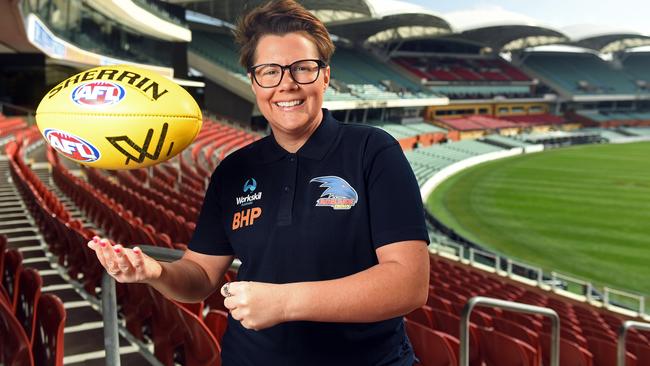Women coaches have proved their worth, so why aren’t more given a chance in Australia?
Rumours a cabal of powerful women ousted Matildas coach Alen Stajcic are just wrong. But women have proved their worth as coaches across the globe. So why aren’t they given a shot here? Jessica Halloran asks.

Football
Don't miss out on the headlines from Football. Followed categories will be added to My News.
The statistics don’t lie: when given the chance, female soccer coaches can dominate.
Over 18 years, female coaches have guided national women’s teams to 12 of the 13 major titles — World Cups, Olympics and European championships.
MATCH: HOWLER SENDS AUSSIES OUT OF ASIAN CUP
LATEST: REASONS FOR MATILDAS SACKING STILL UNCLEAR
CHALLENGE: FFA SEEKS HELP TO FIND NEW COACH
This is a major achievement because the fact is, women are vastly under-represented in the global soccer coaching ranks, but still, female coaches have managed to be overly successful.
This stat says women can get the job done — if given the chance.
Over the past week, the narrative has been pedalled that Matildas coach Alen Stajcic was axed because he is a man.
That story, at times, has deflected the conversation away from Stajcic’s flaws and on to high ranking soccer women who supposedly went on a “witch hunt” to replace him with a female coach.
The line was that the “lesbian mafia” had finally got him.
The homophobic slur referred to several gay and straight women who occupy the soccer ranks.
It’s unproven, untrue and impossible that women have this much power in soccer.

The FFA has maintained Stajcic wasn’t sacked because he was a man. In a board briefing this week the criteria for appointing Stajcic’s successor was raised (it included a proven track record at major tournaments) and gender preference was not mentioned.
There just isn’t and wasn’t a pack of well-mentored, highly qualified Australian women coaches lining up, waiting for Stajcic’s demise so they can have a shot at coaching the Matildas.
And that’s one of the real issues in all of this Matildas’ mess — the lack of women at the top of the coaching game in Australia.
While there are international female candidates being floated for the Matildas job, including Germany’s World Cup-winning coach Silvia Neid and the US under-20s mentor Jitka Klimkova, why are there not more women at the top of the Australian soccer coaching ranks? Sure, Rae Dower, the Matildas’ junior head coach, a respected and highly-qualified with decades of experience, a pro-licensed coach, is likely to put her hand up for the job.
But why isn’t there more Australian women at the top of the game?
A photo from the Asian Cup last year illustrates the problem — it shows just one female staff member on the bench, and she wasn’t a coach.

The small number of female coaches is a problem across several sports here.
Like many sports in this country, bar netball and basketball, the Football Federation of Australia, just like the AFL, NRL, swimming and rugby, face a gender inequality issue in their coaching ranks.
When you talk to most aspiring and current female coaches, some feel overlooked, struggle to get a break or even mentored by successful male coaches. They are paid poorly and are rarely promoted. They often find sport or club cultures unwelcoming and unfriendly.
“The struggle is getting in to that top role,” says one female coach. “But, when we do get into the role, statistics show women are quite successful.”
Some of the best coaching talent in the country has been lost because of mismanagement.
Take AFLW Adelaide Crows’ premiership-winning coach Bec Goddard. After winning the inaugural AFLW flag she decided she wanted to be a better coach. She wanted to make it her career. She wanted to improve her skills, had hoped for a chance with the men’s team in the AFLW off-season.
The Crows didn’t offer her a full-time job and she exited the game after the club didn’t provide her with the pathway to expand her skills. Goddard, an expert at nurturing talent, now doesn’t coach.
Michelle Cowan also left Fremantle’s football club after two seasons, frustrated by a lack of opportunity and support. This week the AFL Coaches Association unveiled the “women’s coaching crusade” designed to improve the pathway for women coaches and opportunities for current AFL coaches to mentor them.

Hopefully, things will change because of this.
Meanwhile in the NRLW there is one female coach (the Warriors’ Luisa Avaiki) but others like Tahnee Norris have failed to get a look in at the top of the game (men’s or women’s).
Norris, who guided the women’s Burleigh Bears team to four straight premierships, says she can’t get a foot in the door at the NRL or NRLW. She just wants a go.
In 2014 Andy Murray did a wild thing: he made Amelie Mauresmo his coach.
At the time a player texted him and asked him if he would be hiring “a dog” to coach him next. This week she coached Frenchman Lucas Pouille through to the Australian Open semi-finals.
Pouille made a strong point about her this week.
“She has the right state of mind, she knows everything about tennis,” Pouille said. “It’s not about being a woman or a man. It doesn’t matter. You just have to know what you’re doing, and she does.”
Exactly.
At the end of the day, this issue is not about gender, it’s just about opportunity.


